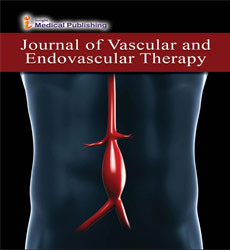Building the Future in Vascular Surgery
Paulo Eduardo Ocke Reis
DOI10.21767/2573-4482.100036
Paulo Eduardo Ocke Reis*
Department of Specialized and General Surgery, Fluminense Federal University, Rio de Janeiro, Brazil
- *Corresponding Author:
- Paulo Eduardo Ocke Reis
Department of Specialized and General Surgery
Fluminense Federal University
Rio de Janeiro, Brazil.
Tel: +55 21 2629-5000
E-mail: vascular@pauloocke.com.br
Received Date: January 07, 2017; Accepted Date: January 13, 2017; Published Date: January 19, 2017
Citation: Reis PEO. Building the Future in Vascular Surgery. J Vasc Endovasc Surg. 2017, 2:1. DOI: 10.21767/2573-4482.100036
Keywords
Vascular Surgery; Endovascular Surgery; Endovascular Procedures; Future Perspectives; Future Prospects
All human development is based on previously disseminated knowledge and technological advances. In the last two decades the speed and volume of information have increased exponentially.
Every year we launch ideas for improvements in existing devices and new inventions that facilitate vascular and endovascular surgery. At the center of everything we have the desire to accelerate the knowledge, that will improve people`s quality of life and reduce health care costs.
Then the Question Arises, How Should We Build the Future for Vascular Surgery?
First of all as predicted by Veith’s Society for Vascular Surgery (SVS) Presidential Address in 1996 all vascular surgeons must become endocompetent, learn about endovascular procedures and embrace them [1]. Now it is easy to predict that almost 75- 95% of vascular lesions will by 2016 be treated by endovascular techniques usually by percutaneous approaches [2]. Endovascular treatments have had such rapid development and become so well accepted because they are a minimally invasive approach [3]. However we must always base acceptance of these techniques on their outcomes and continue to place results and the quality of life of our patients above all else [1-3]. Schneider stresses that we need to be capable and skilled in the use of any new tool before we offer it to our patients. Innovations are important, but only when they prove to benefit our patients [3].
Progress and caution must go hand in hand to have a satisfactory effect on what we call better results and real quality of life for our patients. We must engage in practice and also research. In 2013, the SVS aligned the main objectives and strategies for the future of the speciality and the importance of the scientific discovery [4]. The SVS Foundation Career Development Program is successful in producing independent vascular scientists that contribute to academic activities [4]. In 2014, the Vascular and Endovascular Research Network (VERN) was founded with the goal of undertaking and promoting high quality vascular audit and research across the UK [5].
The Future outlook for Vascular Surgery is promising for therapeutic evolution is a fact in the treatment of vascular diseases. Often there is a need for Randomized Controlled Studies (RCTs) to define the best direction for treatments to take. However, RCTs can have their flaws and other types of evidence may be required in many situations. Despite the need for such evidence and RCTs, is already clear that endovascular therapies will be a viable and valuable treatment option for patients with various vasculopathies. However, there continues to be a need for more clinical studies and animal research to continue to improve morbidity and mortality in patients with vascular diseases.
References
- Veith FJ (1997) Presidential address: Charles Darwin and vascular surgery. J Vasc Surg 25: 8-18.
- Veith FJ (2016) A look at the future of vascular surgery. J Vasc Surg 64: 885-890.
- Schneider PA (2015) The future of vascular surgery. J Vasc Surg 61: 1357-1365.
- Kibbe MR, Dardik A, Velazquez OC (2015) The vascular surgeon-scientist: A 15-year report of the Society for Vascular Surgery Foundation/National Heart, Lung, and Blood Institute-mentored Career Development Award Program. J Vasc Surg 61: 1050-1057.
- Bosanquet DC (2016) How to Engage in Trainee-led Multicentre Collaborative Vascular Research: The Vascular and Endovascular Research Network (VERN). Eur J Vasc Endovasc Surg 52: 392.
Open Access Journals
- Aquaculture & Veterinary Science
- Chemistry & Chemical Sciences
- Clinical Sciences
- Engineering
- General Science
- Genetics & Molecular Biology
- Health Care & Nursing
- Immunology & Microbiology
- Materials Science
- Mathematics & Physics
- Medical Sciences
- Neurology & Psychiatry
- Oncology & Cancer Science
- Pharmaceutical Sciences
